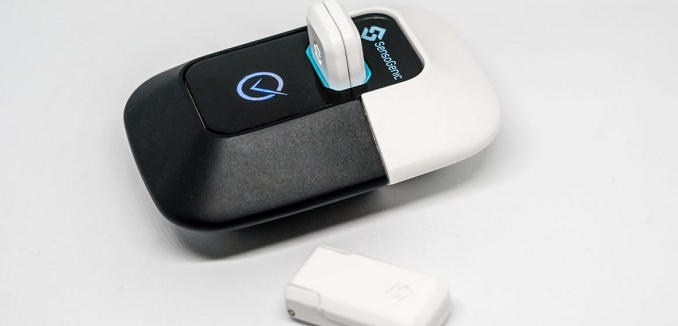At one year old, Noam Yasovsky was diagnosed with allergies to eggs, sesame, and milk. Eating at other people’s homes or in restaurants has been a challenge ever since, necessitating Noam to bring his own food or try to determine which dishes won’t put him at risk.
Noam’s father, Alon, discovered that about 250 million people around the world – 8% of children and 4% of adults — have food allergies. In the United States alone, a food allergy triggers anaphylactic shock every six minutes. Sometimes, these incidents are fatal.
His startup, SensoGenic, is developing a handheld digital food allergen biosensor for consumers.
It’s the only such device capable of detecting and identifying all the common allergens — milk, eggs, peanuts, tree nuts, wheat, soy, fish and shellfish — from a single food sample placed on a disposable pad and analyzed by the battery-operated biosensor unit.
SensoGenic’s device uses patented nanotechnology to detect specific allergy-causing proteins at a level of 10 ppm (parts per million), considered the lowest adverse reaction level. Users get results on their smartphone via a dedicated app.
“The app will also enable users to share their experiences at a restaurant or give a recommendation to a network of food-allergy sufferers who use our device,” says Yasovsky.
Noam, now 15 years old, recently helped his dad demonstrate a mockup of the device – engineered by Israeli industrial design firm Taga – to participants at the 18th annual MIXiii-Biomed Conference and Exhibition in Tel Aviv.
Planned to be sold online and later in restaurant chains through global distribution partners, the biosensor unit (which does not require regulatory approval) will be priced at around $199 and the disposable testing pads at 95 cents apiece.
By contrast, an American brand of handheld peanut and gluten biosensors on the market use $4 disposable capsules to detect the specific allergen with antibody-based chemistry.
SensoGenic can be more affordable and multipurpose because it uses a unique formulation based on cellulose, an abundant and cheap natural polymer, to attract all allergenic proteins from the food sample.
[Photo: Israel21c]




